2022年10月07日
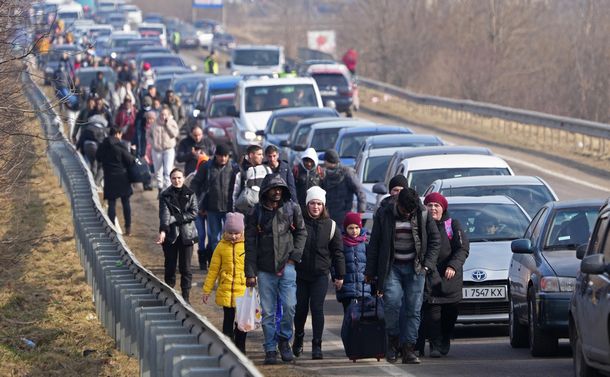 People heading toward the Polish border to leave Ukraine= February 26, 2022, near Shehyni, western Ukraine
People heading toward the Polish border to leave Ukraine= February 26, 2022, near Shehyni, western UkraineOleksiy Goncharenko is member of the Ukrainian Parliament, elected in Odesa Oblast. He is a founder of the Ukrainian network of free language education and volunteer activity “Goncharenko Centre” and also Vice President of the PACE Committee on Migration, Refugees and Internally Displaced Persons.
Stefan Tompson is a British-born Polish-South African commentator and TV Presenter, the host of “Polish Legacy” a historical and cultural TV documentary series about traces of Polish culture in the Borderlands and shared Polish and Ukrainian culture and history.
※This article is published in two languages, Japanese and English. See also the Japanese version. (The Asahi Ronza)
Six months after the Russian invasion of Ukraine, which led to the worst refugee crisis in Europe since WWII, Poland and Ukraine have seen a major rapprochement, with Poland taking the lead in welcoming, assisting and helping Ukrainian refugees.
Since the Russian invasion began, nearly 5 million people have left Ukraine and more than 7 million have fled their homes and settled elsewhere in the country, according to UNHCR data.
In total, 3.7 million refugees have registered in the EU under a Temporary Protective Directive, with an estimated 1.5 to 2 million Ukrainians staying in Poland as of August 2022, of which 1.2 million have officially registered. Of those, a staggering 90% are women and children.
To provide context, Poland, which is broadly portrayed as an anti-migration country, has actually been issuing more residence permits to immigrants than any other EU state since 2017, with Ukrainians being the largest group.
The latest available figures from 2019 showed 2 million foreigners were living in Poland, making up some 5% of the Polish population.
A striking aspect of the war was the discovery that not only did Poles empathize with Ukraine but that their caring went beyond simple gestures such as changing a Facebook profile picture.
Poles opened their homes to strangers, drove en masse to the border to help people travel across Poland, and donated food, clothes and even their own blood.
This gesture of Polish national solidarity towards Ukrainians is even more moving when you consider that Poles and Ukrainians have had a difficult past. When it mattered, neighbours were united, and the last few months have shown the Poles’s true colors: that of a Christian society that practices what it preaches.
In August, in a CBOS poll, 84% of Poles still supported welcoming Ukrainian refugees. This proves that the fatigue and frustration that many predicted would arise as the war dragged on has not materialized - perhaps because Poles, who have been tried and tested by Russia over the centuries, understand better than most what Ukraine is going through, but also because Ukrainians have been wonderful guests - respectful of their hosts and the country that has welcomed them. For all the tragedy of the war, this strengthening of national bonds has been a beautiful unintended consequence.
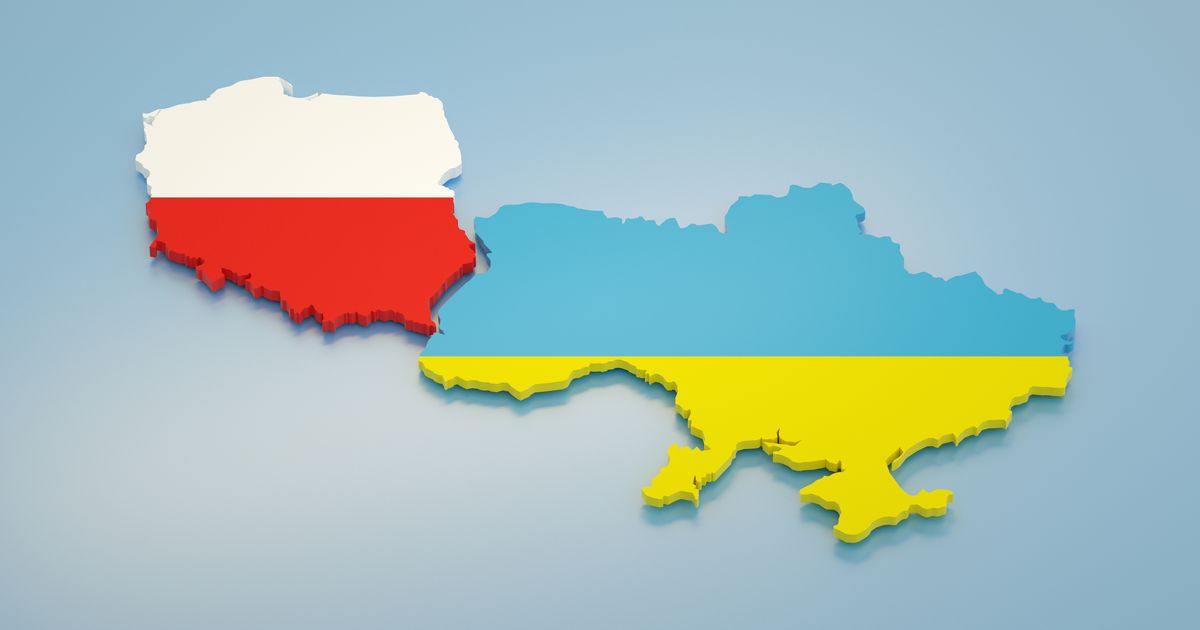 Yuriosav/shutterstockcom
Yuriosav/shutterstockcomIntentions are not everything. How has such a logistical feat been accomplished? Poland and Ukraine both have substantial tech talent pools, so it is no surprise that developers have come up with creative ideas to alleviate the crisis.
Just a few days after the war started, Poles created IHELPYOU.app which connected refugees with people willing to support them- be it by providing accommodation or transports, organizing medical aid or just shopping.
Within weeks, Poles created a multitude of purpose designed apps, including SOS UA (a Polish, Russian and Ukrainian language app to connect refugees with volunteers). The Polish communication app TokLok, one of the safest communication services in the world, offered Ukrainians their app for free, making it possible for them to organize their aid efforts for Ukraine without risking exposure to Russian intelligence operations.
Ukrainians in Poland have also been using their skills. The founders of Lalafo, a second-hand e-commerce, saw studies showing 41% of refugees struggle with a lack of clothing and basic products. They adapted their platform for the Polish market to provide second hand clothes to refugees, this time as a charity effort.
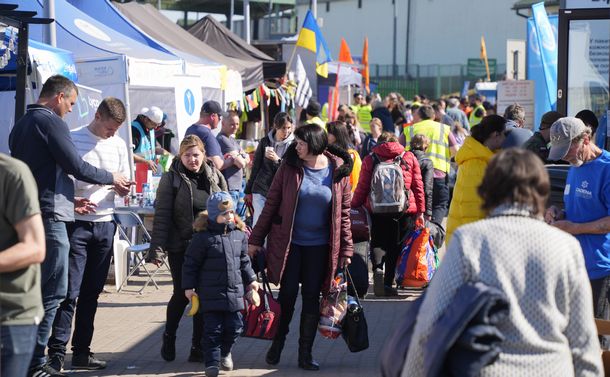 Refugees evacuated from Ukraine to Poland. Many aid groups gathered at the border between the two countries=March 23, 2022, in Medyka, eastern Poland.
Refugees evacuated from Ukraine to Poland. Many aid groups gathered at the border between the two countries=March 23, 2022, in Medyka, eastern Poland.As Polish civil society stepped up, spontaneously and somewhat chaotically, the Polish government was aware of the logistical nightmare ahead.
The first step was to provide millions of people with essentials - a safe place, water and food. This weight was picked up by Polish civil society but the Polish government was aware that the public could not carry the burden alone.
Swiftly, the state apparatus began to turn its wheels, with hundreds of thousands of public servants focusing their long workdays on providing the necessary structure and support to accommodate millions of refugees in the space of a few weeks.
Though the government coordinated the help and drew up the Polish strategy, it was Polish state companies that footed the bill and took on the logistics of various impressive efforts.
PZU, Poland’s largest insurance company, between the 24th of february to the 24th of April issued and covered over 54 thousand 30 day civil liability insurance policies, at a cost of 7.5 million PLN.
Polish state railways made it possible for fleeing Ukrainians to use their services free of charge to move around Poland, with 2.3 million Ukrainians making use of that free service between the 28th and the 30th of June. The company also modified one of its trains to bring wounded Ukrainian soldiers and civilians across the border for treatment in Polish hospitals.
As the war drags on, some understandable tensions have appeared, and recently, a hashtag (potentially Russian orchestrated) has appeared on Polish Twitter, calling for a “Stop to the Ukrainisation of Poland”.
As much as Ukrainians envy Poland’s successful post-communist transformation, impressive economic growth over three decades, and joining NATO in 1999 and the EU in 2004, Ukrainian have no cause to celebrate a mass exodus of Ukrainians to Poland.
As much as we are grateful that our women and children are in safe places, we yearn for peace in our country and for our loved ones to come home.
It is important to note the tragedy of Ukraine’s demographics. Ukraine has been shrinking since 1990, when it attained its peak of 51.6 million inhabitants, to an estimated 43.78 million in 2022 (naturally including the Donbas and Crimea) - a decline of 10.7 million, or over 20% of the population. In short, even if Ukraine wanted to colonize Poland, which it does not, we simply do not have the human resources to do it.
We have seen the tragedy of Polish mass migration after 2004, which saw millions of working age Poles leave the country, with many not returning. Many of the children, who either left Poland very young, or were born abroad, lost their Polish identity and were assimilated into the countries their parents migrated to.
Precisely because of this awareness, Polish authorities have made it a priority for the hundreds of thousands of Ukrainian children in Poland to maintain their Ukrainian identity - while also giving them a chance to meet with young Poles their own age.
Dobre Kolonie, summer camps organized by PZU, are an excellent example, giving young Ukrainian the chance to meet their Polish counterparts without obscuring their own national identity, to make sure that Ukrainians are not left out of Polish society and do not feel like a marginalized minority while they are here. Hopefully, many of the friendships made this summer will endure, whether in Poland or across the border.
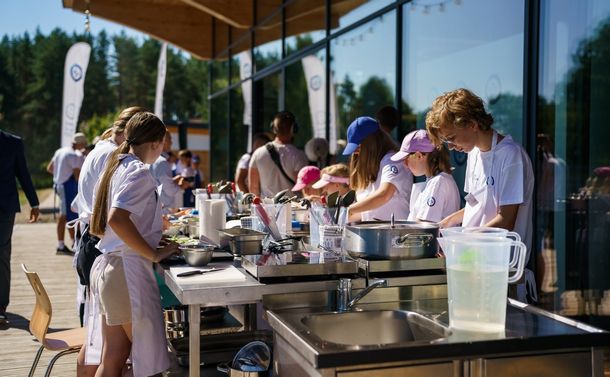 Dobre Kolonie, summer camps organized by PZU(©Stefan Tompson)
Dobre Kolonie, summer camps organized by PZU(©Stefan Tompson)The role Poland has played as Ukraine’s largest neighboring EU state is difficult to overestimate. It has served as a hub for military and humanitarian aid flowing to Ukraine. Poland has also taken on the role as the country which gives shelter to most of the Ukrainians who decided to flee abroad in the chaotic first weeks of the war.
The Poles, fully aware of the hardships suffered by the generations of their parents and grandparents during the Second World War, better understand the evil that Russia has unleashed on Ukrainians than people in Western Europe.
It is this compassion, visible in how Poles have treated Ukrainian refugees, that will serve as the bedrock for Polish-Ukrainian cooperation for decades to come.
In April 1920, Poland and Ukraine signed an alliance against Soviet Russia during the Polish-Bolshevik War. Unfortunately, Ukraine did not survive as an independent state during the interwar era, while Poland lost its sovereignty in 1939 due to a combined German-Soviet assault.
The lesson is clear: an independent Ukrainian state and excellent Polish-Ukrainian relations are essential for peace and security in the region.
We all hope that the war ends with a Ukrainian victory as soon as possible, that the millions of Ukrainian refugees will be able to return home and that Polish-Ukrainian relations will continue to flourish.
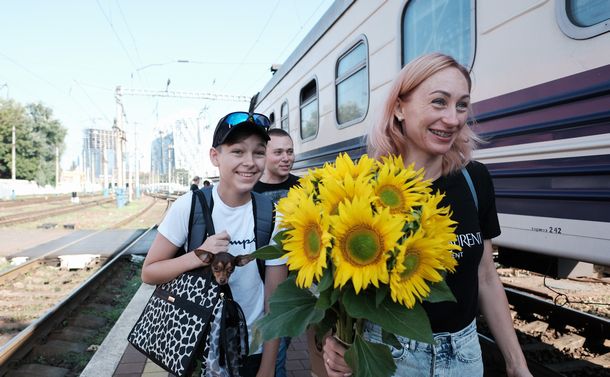 His wife (right) and son smile as they are welcomed by her husband (back center), holding the flowers presented to them; they will stay there for about a month before returning to Poland, where they have taken refuge=August 18, 2022 in Kyiv, Ukraine.
His wife (right) and son smile as they are welcomed by her husband (back center), holding the flowers presented to them; they will stay there for about a month before returning to Poland, where they have taken refuge=August 18, 2022 in Kyiv, Ukraine.※This article is published in two languages, Japanese and English. See also the Japanese version. (The Asahi Ronza)
有料会員の方はログインページに進み、デジタル版のIDとパスワードでログインしてください
一部の記事は有料会員以外の方もログインせずに全文を閲覧できます。
ご利用方法はアーカイブトップでご確認ください
朝日新聞社の言論サイトRe:Ron(リロン)もご覧ください